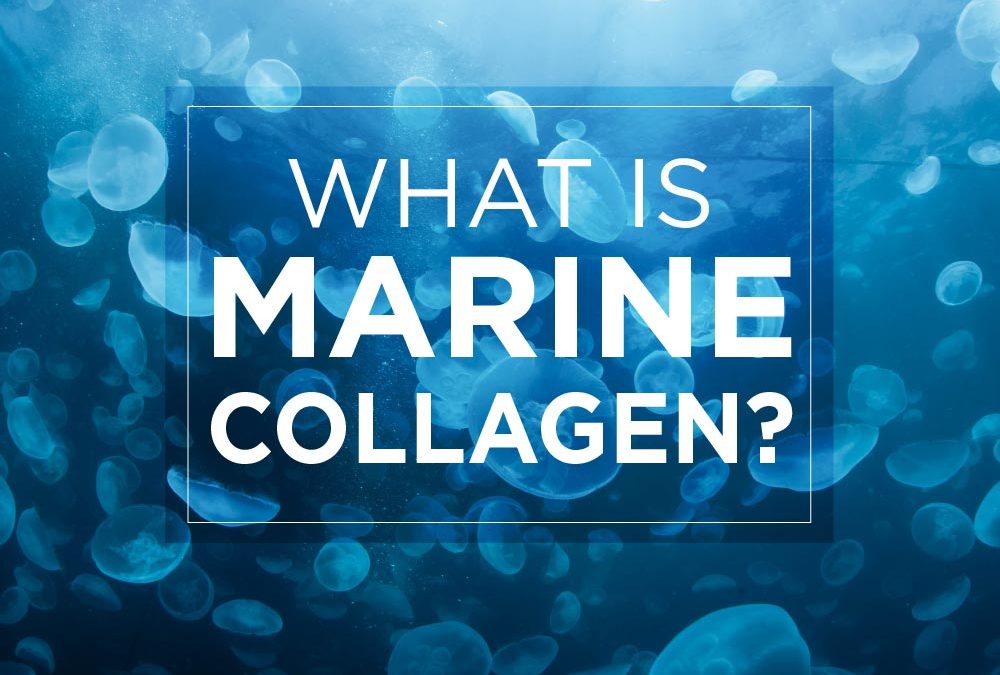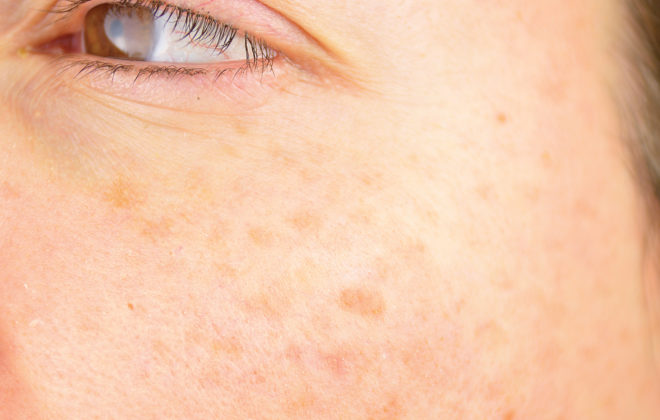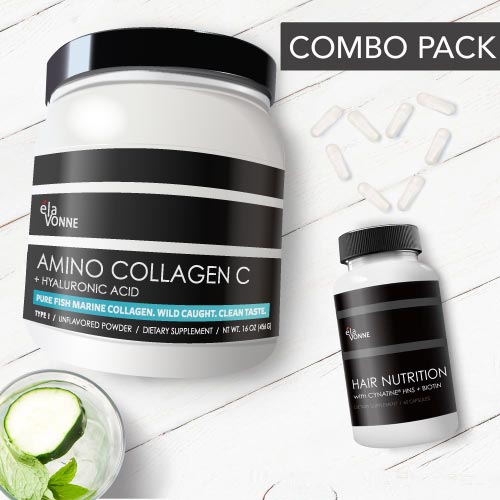What is Marine Collagen
Marine collagen is a form of protein derived from sea animals. Marine collagen can come from all sorts and forms from gelatin to hydrolyzed marine collagen peptides, and is considered the safest form of collagen for humans. In this article, we discuss what marine collagen is, why marine collagen supplements can bring significant health benefits, and which are best for your skin, joints, digestive health, and whole body.
What is Marine Collagen?
Marine collagen is a protein that may consist of type I, type II, and type III collagen3. Judging by the name, you may assume that all marine collagens are derived from fish, however, this special kind of protein can be extracted from many different types and parts of sea animals. For consumption, this type of collagen can be made into solid gelatin or hydrolyzed (peptide) form. Due to the newly realized health benefits, demand has grown by over 500% in the last several years4 . This leads us to wonder, which products are the best for beauty (hair, skin, nails) and body health (gut, joints). Also, which types of sea animals supply the best type of collagen for human consumption.
This protein is extracted from a number of sea animals and even some marine mammals. Predominantly type I collagen, this is a prime component in fish skins and mammal skins, as well as a major protein found in jellyfish. Type II marine collagen can be found primarily in fish cartilage and marine sponges. Type III marine collagen is found most abundantly in marine mammals, dominant in the lungs, liver, intestines, and spleen.
Where Does Marine Collagen in Supplement and Powder Form Come from?
Fish skins and jellyfish are typical sources for marine collagen products, but not a typical part of the western diet, and understandably so. Supplements made from pure fish will likely be called out on the label as it is commonly regarded as the best source.
The great thing about fish collagen powders is that fish skins, once a throw-away bi-product, are now put to excellent use. Once the fish are caught and harvested for their meat, the skins are dedicated to hydrolysis to where the collagen is extracted within them. In some instances, jellyfish are used.
Structure of Marine Collagen
In its intact form, collagen is very hard to digest and not well used by the body. Therefore, collagen in peptide form (hydrolysate) is the preferred form for consumption. When hydrolyzed, no amino acids are lost in the process. Simply put, it is predigested and ready for your body to use.
Nutritional Information
Marine collagen, when hydrolyzed, contains approximately 4 calories per gram with zero sodium, fat, or sugar. And, when carefully manufactured under Good Manufacturing Practices, should be very light in flavor or odor, as well as free from contaminants.
Primary Attributes of Marine Collagen
Lower Risk
Collagen originating from sea animals, such as jellyfish and fish skins, is often preferred over land mammals as it is considered low risk. For instance, collagen from marine sources is free of religious concerns associated with bovine or porcine sources. And while extremely rare, recent outbreaks of mad cow disease and other transmittable diseases from land animals have raised concerns about proteins derived from bovine products (rest easy, this is not an issue with grass fed beef collagen hydrolysates).
Low Molecular Weight
Marine collagen is almost exclusively type I collagen, and its peptides have a lower dalton weight than bovine collagen. While bovine hydrolysates offer a good source of collagen for the body, the smaller sized peptide molecules of marine collagen are more bioavailable and better absorbed by the body.
Unique Amino Acid Profile
The amino acid profile of marine collagen is high in glycine, hydroxyproline, and proline. The activity of amino acids in the body is a complicated story, but these three dominant amino acids of this particular type of protein are what make it special for beauty applications.
Notably, you won’t be able to find hydroxyproline in any protein other than collagen, and the essential amino acid, glycine, is delivered in high amounts with marine collagen by comparison. Among many positive benefits, these amino acids hold the impressive qualities of protecting the skin cells against oxidative damage, stimulating natural collagen synthesis, and playing a key role in the creation of healthy DNA and RNA strands. Anyone interested in healthy aging would be wise to consider adding marine collagen to their diet for these reasons.
Marine Collagen Applications
Medicine, Cosmetic, and Pharmaceuticals
Collagen is held as one of the most useful biomaterials due to its high compatibility with the human body. Because of its low risk attributes, marine collagen specifically is the collagen of choice for vast medical and cosmetic applications. In medicine, it has been studied for its hemostatic properties (controlling blood loss), and widely used for sustained drug delivery systems, and tissue engineering9,10,12.
Beauty Nutrition
Once considered a useless byproduct of the fish industry, collagen hydrolysates from fish skins are now a valuable commodity. Following much research on the positive effects of collagen supplementation for wound healing and skin aging, ingestible marine collagen hydrolysates from various sources have flooded the market, those from fish being the most highly regarded.
“Oral collagen supplements also increase skin elasticity, hydration, and dermal collagen density. Collagen supplementation is generally safe with no reported adverse events.”14
J Drugs Dermatol. 2019 Jan 1;18(1):9-16. Oral Collagen Supplementation: A Systematic Review of Dermatological Applications
How to Get Marine Collagen in Your Diet
Marine collagen peptide powder is an easy add into your daily routine. It’s versatile and blends perfectly with smoothies, baked goods, soups, hot beverages, and more. The best supplements are hydrolyzed powders which dissolve well into many types of foods and have no taste or texture.
Any additional ingredients in a fish collagen supplement should serve to enhance the activity of collagen in the body, such as hyaluronic acid and vitamin C. These ingredients, considered natural collagen boosters, perfectly compliment the amino acids without ruining taste, texture, or quality. In fact, you can replace some or all of your whey-based or other protein powders (known to contain lots of sugars and unnecessary additives) with a pure marine collagen powder, like Amino Collagen C.
Make it a Habit
Like any positive diet change, make it easy on yourself to form the habit. Keep a canister of Amino Collagen C in a handy spot so you can easily add it to your diet at the same time each day. While it’s not necessary to eat collagen at the same time each day, doing so will help form the routine, and your skin and health will thank you. The moment you eat the protein peptides, your body absorbs it and uses it. That’s what is so wonderful about marine collagen.
Summary
- Marine collagen can come from fish skins, marine mammals, jellyfish and marine sponges.
- Marine collagen is primarily type I collagen, which is the dominant type of collagen found in our bodies.
- Collagen has a unique amino acid profile, containing hydroxyproline, not present in other proteins, and high amounts of glycine.
- Marine collagen is best consumed in hydrolyzed form.
- Hydrolyzed marine collagen is better absorbed by the body than hydrolyzed bovine collagen due to the smaller peptide molecules.
- Supplementing with marine collagen may improve your skin firmness.
- Supplementing with marine collagen may help improve gut health.
- Supplementing with marine collagen may help improve wound healing.
- Supplementing with marine collagen may help reduce the signs of aging by improving skin moisture retention, and slowing the formation of wrinkles.
- Marine collagen powder can be a versatile and easy supplement to add to your daily diet.
- Marine collagen supplements are best when free of additives and sugars.
- Collagen boosters, like hyaluronic acid and vitamin C are great compliments to marine collagen hydrolysates.
- Hydrolyzed marine collagen is absorbed into the body quickly after it is eaten.
Cites and References
1. J Cosmet Dermatol. 2018 Feb;17(1):20-26. doi: 10.1111/jocd.12450. Epub 2017 Nov 16. Collagen: A review on its sources and potential cosmetic applications. Avila Rodríguez MI, Rodríguez Barroso LG, Sánchez ML.
2. Mar Drugs. 2019 Feb 14;17(2). pii: E118. doi: 10.3390/md17020118. Collagen of Extracellular Matrix from Marine Invertebrates and Its Medical Applications. Rahman MA.
3. Felician FF, Xia C, Qi W, Xu H. Collagen from Marine Biological Sources and Medical Applications. Chem Biodivers. 2018 May;15(5):e1700557. doi: 10.1002/cbdv.201700557. Epub 2018 May 21.
4. Silva T., Moreira-Silva J., Marques A., Domingues A., Bayon Y., Reis R. Marine origin collagens and its potential applications. Mar. Drugs. 2014;12:5881–5901. doi: 10.3390/md12125881. [PubMed]
5. Sadowska M., Kolodziejska I., Niecikowska C. Isolation of collagen from the skins of baltic cod (Gadus morhua) Food Chem. 2003;81:257–262. doi: 10.1016/S0308-8146(02)00420-X.
6. Gelse K., Poschl E., Aigner T. Collagens—Structure, function, and biosynthesis. Adv. Drug Deliv. Rev. 2003;55:1531–1546. doi: 10.1016/j.addr.2003.08.002. [PubMed]
7. Ferreira A.M., Gentile P., Chiono V., Ciardelli G. Collagen for bone tissue regeneration. Acta Biomater. 2012;8:3191–3200. doi: 10.1016/j.actbio.2012.06.014. [PubMed]
8. Gauza-Włodarczyk M, Kubisz L, Włodarczyk D. Int J Biol Macromol. 2017 Nov;104(Pt A):987-991. doi: 10.1016/j.ijbiomac.2017.07.013. Epub 2017 Jul 4. Amino acid composition in determination of collagen origin and assessment of physical factors effects.
9. Int J Pharm. 2001 Jun 19;221(1-2):1-22. Biomedical applications of collagen. Lee CH, Singla A, Lee Y.
10. Nagai N., Yunoki S., Suzuki T., Sakata M., Tajima K., Munekata M. Application of cross-linked salmon atelocollagen to the scaffold of human periodontal ligament cells. J. Biosci. Bioeng. 2004;97:389–394. doi: 10.1016/S1389-1723(04)70224-8. [PubMed]
11. Collagen: A review on its sources and potential cosmetic applications. María Isabela Avila Rodríguez MRS, Laura G Rodríguez Barroso MRS, Mirna Lorena Sánchez PhD, 16 November 2017 https://doi.org/10.1111/jocd.12450
12. Hoyer B., Bernhardt A., Heinemann S., Stachel I., Meyer M., Gelinsky M. Biomimetically mineralized salmon collagen scaffolds for application in bone tissue engineering. Biomacromolecules. 2012;13:1059–1066. doi: 10.1021/bm201776r. [PubMed]
13. Mar Drugs. 2017 May; 15(5).Hydrolysates of Fish Skin Collagen: An Opportunity for Valorizing Fish Industry Byproducts. María Blanco, José Antonio Vázquez, Ricardo I. Pérez-Martín, and Carmen G. Sotelo
14. J Drugs Dermatol. 2019 Jan 1;18(1):9-16. Oral Collagen Supplementation: A Systematic Review of Dermatological Applications. Choi FD, Sung CT, Juhasz ML, Mesinkovsk NA.





